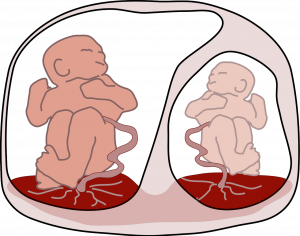While pregnancy is often a time of great happiness for both mothers and fathers, it is also a period filled with many questions and discoveries, especially for first-time mothers. It’s natural for many doubts to arise—things you never imagined you would ask yourself, but that now seem very important. One of the most frequent questions pregnant women have is: Do pregnant women ovulate? That’s exactly what we’ll discuss in today’s article. So, if you’re curious about this topic, read on to the end and discover all the information you need!
What is Ovulation?
First of all, we need to explain what ovulation is and how it works. This explanation is essential so we can delve into today’s subject and understand the issues discussed here more deeply. Ovulation is a process that is part of every woman’s menstrual cycle1. It is when an egg travels from the ovary to the fallopian tube so it can be fertilized, making this a woman’s fertile period. If this fertilization does not occur, menstruation happens, which is nothing more than the remnants of the egg’s mucosa and some other substances being expelled through the vagina. A woman’s regular cycle lasts about 28 days on average, which means ovulation usually happens between the 11th and 15th day after her last period. However, it’s important to stress that this is only an average and should not be used as a way to determine the exact day of ovulation. We’ll discuss this later in the article and address more effective ways you can find this out.
Signs of Ovulation
When ovulation is happening in a woman’s body, some signs are obvious, although not all of them always appear. The main ones are:
- Vaginal discharge – This is a type of secretion that helps lubricate the vagina and also makes it easier for sperm to enter for fertilization.
- Increased appetite – During ovulation, a woman’s body produces a higher level of progesterone, which also increases appetite.
- Increased body temperature – Another side effect of rising progesterone is an increase in body temperature, which is more noticeable in some women than others.
- Increased libido – Also due to the progesterone hormone, many women may experience increased libido during ovulation.
- Pelvic pain – Pelvic pain can also be a symptom for some women during ovulation, although it is less common than the other symptoms listed here.
It’s important to note that there are many women who do not experience any of these symptoms and still ovulate normally. Therefore, while these are good indicators, they cannot be used as definitive proof that a woman is or is not ovulating on a given day.
How to Know the Exact Day of Ovulation?
As mentioned earlier, there is an average which estimates that a woman’s ovulation occurs about 14 days before the next period. However, since the human body is subject to many variables that can affect this average, other methods tend to be more effective2. The main one is the test that measures the level of LH (luteinizing hormone) in a woman’s urine and the level of progesterone in her blood. Transvaginal ultrasound, however, is the most accurate method to determine if a woman is ovulating or not. Of course, you don’t need to have tests every day to find out whether you are ovulating. That’s why there are other methods like pharmacy tests, which are very effective, although not always 100% accurate. This is a great option for women with irregular periods to know exactly when they are ovulating.
Is it Possible to Ovulate While Pregnant?
Now that we have explained what ovulation is and how this process occurs in a woman’s body, it’s easier to discuss today’s main topic—whether pregnant women ovulate or not. First of all, it’s important to point out that during a normal pregnancy, a woman’s body prevents her from continuing to ovulate so that no other egg can be fertilized and, subsequently, so that no complications happen with the ongoing pregnancy. However, there are extraordinary situations in which a woman continues to ovulate even after becoming pregnant3. This situation is caused by hormonal changes that make the body continue to function as usual, even after fertilization has occurred. Although it is possible, it is extremely rare and usually happens to women who have used hormone treatments to help them conceive. This phenomenon is known as superfetation. 
Is It Possible to Get Pregnant While Already Pregnant?
This question might sound strange, but it is more common than you might think. As explained earlier, it is possible for a woman to keep ovulating even after her egg has been fertilized, which can lead to a twin pregnancy if she has unprotected sex. This can also happen because sperm can stay alive inside the woman’s body for up to 3 days and may end up fertilizing an egg later if this phenomenon occurs. It is important to remember that this only happens when the woman has only been pregnant for a few days, and is extremely rare. Through an ultrasound, you can identify that one fetus is older than the other by analyzing its development. However, this does not always mean that the woman got pregnant while already pregnant, since fetuses can develop at different rates even during a normal pregnancy. Even if superfetation is confirmed, it doesn’t have much impact on how a woman experiences a twin pregnancy, since the age gap between the two babies is usually only a few days and doesn’t make much of a difference at birth. If the difference is a bit larger, the best recommendation is for delivery to be scheduled at a midway point between the ages of the two so there’s no risk involved. Even though it may seem trivial to some people, questions such as whether pregnant women ovulate are very important to others. Therefore, clarifying not only this doubt but also other questions regarding changes in a woman’s body during pregnancy is beneficial in many ways. First, it helps women feel more at ease with what is happening to their bodies during a time of so much uncertainty, and second, it helps them get to know their own body better—which is always a good thing. So, don’t be afraid of having questions and, above all, of seeking answers. That’s how you can have a healthier and more peaceful pregnancy. And in the end, that’s what every future mother wants.











